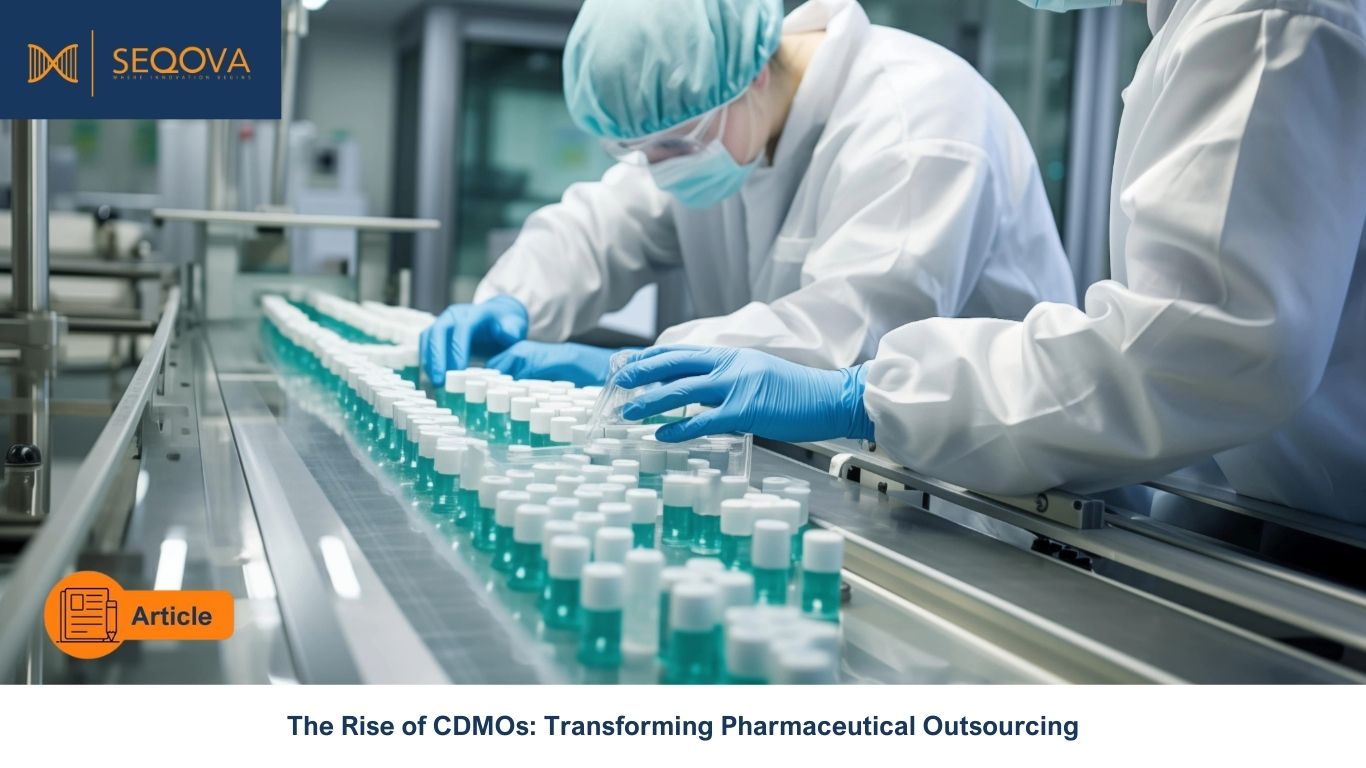
Discover the key advantages & global trends in CDMOs
Introduction: CMO vs. CDMO – What’s the Difference?
In the ever-evolving pharmaceutical industry, outsourcing has become a critical strategy for drug companies looking to streamline operations and accelerate time to market. Traditionally, pharmaceutical firms relied on Contract Manufacturing Organizations (CMOs) for large-scale drug production. However, as the industry shifts towards more complex therapies and personalized medicine, Contract Development and Manufacturing Organizations (CDMOs) have emerged as a more comprehensive solution. In this article, we will take a more in-depth look into the shift away from CMOs to the more preferred CDMOs and highlight the advantages of CDMOs in the pharma industry. The final insight will be to look at the current trends, providing a glimpse into the future standards and the utilization of possible strategies.
Key Differences Between CMOs and CDMOs
CMOs primarily focus on manufacturing drugs, whereas CDMOs offer both drug development and manufacturing services. While CMOs handle only mass production, CDMOs assist with drug formulation, process optimization, and scale-up. CMOs ensure GMP compliance in manufacturing, but CDMOs go further by providing regulatory support from early development to commercialization. Additionally, CMOs work with finalized drug formulas, whereas CDMOs customize drug formulations and production methods to meet specific requirements. Finally, CMOs are geared toward large-scale production, whereas CDMOs support small-scale clinical trials as well as full commercial manufacturing.
As pharmaceutical companies face increasing regulatory challenges, rising costs, and the demand for innovative therapies, CDMOs have become the go-to partners for drug development and production. For more clarity, refer to the table below for a summary of the differences.
Table 1: Showing the differences between CMOs and CDMOs.
| Feature | CMO (Contract Manufacturing Organization) | CDMO (Contract Development and Manufacturing Organization) |
| Scope of Services | Focuses mainly on manufacturing drugs | Provides both development and manufacturing services |
| Drug Development Support | No R&D or formulation development – only produces pre-formulated drugs | Supports drug development, including formulation, process optimization, and scale-up |
| Target Clients | Companies that already have a finalized drug formula and need manufacturing support | Companies that need help from drug formulation to commercial production |
| Regulatory Assistance | Ensures GMP compliance and regulatory manufacturing standards | Provides regulatory support from early-stage development to commercial launch |
| Flexibility | Works with existing drug formulas and processes | Offers more customization in formulation and production processes |
| Scalability | Primarily focuses on large-scale manufacturing | Supports small-scale (clinical trials) to large-scale (commercial) production |
| Example Use Case | A pharma company with an approved drug outsources production to a CMO | A biotech startup with a new molecule partners with a CDMO for formulation, trials, and production |
Next, let’s explore the advantages of working with CDMOs and the latest global trends shaping this dynamic industry.
The Advantages of CDMOs: Why Pharma Companies Are Making the Switch
As pharmaceutical companies face increasing pressure to accelerate drug development, reduce costs, and navigate complex regulatory landscapes, Contract Development and Manufacturing Organizations (CDMOs) have become invaluable partners. Unlike traditional contract manufacturers, CDMOs offer a comprehensive, end-to-end solution—from early-stage drug development to large-scale commercial production. By leveraging their expertise, cutting-edge technology, and flexible manufacturing capabilities, pharmaceutical firms can streamline operations, mitigate risks, and bring life-saving therapies to market faster. Let’s explore the key advantages of working with CDMOs.
Cost Savings and Efficiency
Setting up an in-house pharmaceutical manufacturing facility requires millions of dollars in capital investment and years of regulatory approvals. By outsourcing to a CDMO, pharmaceutical companies can avoid costly infrastructure and equipment expenses while reducing research and development costs by leveraging the existing drug formulation expertise of the CDMO. Additionally, CDMOs provide economies of scale, which lower the per-unit production cost. This allows companies to focus on drug discovery and commercialization while leaving production to experts.
Faster Time to Market
In an industry where speed provides a competitive advantage, CDMOs help pharmaceutical companies accelerate drug development and approvals. They offer ready-to-use GMP-certified facilities that eliminate the need for lengthy setup processes. Moreover, CDMOs facilitate rapid technology transfers from laboratory settings to commercial-scale production. Their support in clinical trial manufacturing ensures a smooth transition from Phase I to Phase III trials. This accelerated timeline is particularly beneficial for biotech startups and companies developing time-sensitive medications such as vaccines or orphan drugs.
Regulatory Compliance and Risk Reduction
Regulatory challenges are among the biggest hurdles in pharmaceutical production. CDMOs help mitigate these risks by ensuring compliance with FDA, EMA, and WHO regulations. They manage routine inspections, audits, and documentation while handling serialization, supply chain tracking, and quality assurance measures to prevent counterfeit drugs from entering the market. By partnering with a CDMO, pharmaceutical companies can significantly reduce their compliance burden and focus more on drug innovation.
Scalability and Flexibility
CDMOs offer scalable production solutions that can be adjusted based on market demand. Whether a company requires small-batch production for clinical trials or large-scale manufacturing for global distribution, CDMOs provide the necessary flexibility. They allow pharmaceutical companies to scale production capacity up or down as needed to match demand fluctuations. Additionally, CDMOs support the manufacturing of orphan drugs and personalized medicine through specialized small-batch production. Their global manufacturing networks also ensure supply chain continuity, reducing the risk of disruptions. To learn more about drug supply shortages, take a look at the following article.
Access to Cutting-Edge Technologies
CDMOs invest heavily in state-of-the-art technology, providing pharmaceutical firms with access to the latest advancements. They offer continuous manufacturing processes that enable faster and more efficient production. Moreover, CDMOs have the infrastructure for advanced biologics and gene therapy production, allowing pharma companies to develop next-generation treatments. Artificial intelligence-driven quality control and automation further enhance production accuracy by reducing human errors and improving batch consistency. For companies developing complex therapies, CDMOs offer expertise and technological capabilities that would be prohibitively expensive to establish in-house.
Global Trends in the CDMO Industry: Current Trends with Future Implications
The pharmaceutical industry is undergoing significant transformations, and CDMOs are at the center of this evolution. Driven by advancements in drug development, shifting regulatory landscapes, and changing global supply chain dynamics, CDMOs are adapting to meet the increasing demand for innovative and specialized therapies. From the rise of biologics and personalized medicine to digital transformation and strategic partnerships, these trends are reshaping how pharmaceutical companies leverage outsourcing for efficiency, scalability, and market expansion. Let’s explore the key global trends driving the future of CDMOs.
Market Growth & Expansion
The global CDMO market is projected to grow from $146.05 billion in 2023 to $315.08 billion by 2034, with a compound annual growth rate (CAGR) of 7.24%[1]. This expansion is being driven by an increasing demand for biologics and specialty drugs, the rise of small and mid-sized pharmaceutical companies outsourcing drug development, and a greater reliance on CDMOs for advanced therapies such as cell and gene treatments.
Flexible Manufacturing & Digital Transformation
Pharmaceutical companies are increasingly adopting flexible manufacturing models that allow for rapid adjustments in production. CDMOs are responding by implementing modular facilities and automated production lines, enabling faster changeovers between different drug formulations. Artificial intelligence and big data integration are also being leveraged for process optimization and predictive maintenance. Furthermore, blockchain-based supply chain tracking is being utilized to enhance drug safety and traceability, ensuring product integrity throughout distribution.
Strategic Partnerships & Mergers
The CDMO landscape is shifting from simple outsourcing relationships to long-term strategic partnerships. Companies are forming joint ventures, acquisitions, and exclusive collaborations to secure priority access to production capacity, co-develop innovative drug formulations, and share risks while accelerating market entry. High-profile acquisitions, such as Novo Nordisk’s purchase of Catalent’s manufacturing sites[2], demonstrate how pharmaceutical giants are leveraging CDMOs to strengthen their supply chains.
Supply Chain Diversification & Geopolitical Shifts
Geopolitical tensions and supply chain disruptions have prompted many pharmaceutical companies to re-evaluate their CDMO partnerships. India’s CDMO sector is lobbying for regulatory reforms to reduce reliance on Chinese raw materials[3]. Meanwhile, U.S. drugmakers are diversifying their supply chains away from China to mitigate geopolitical risks[4]. Additionally, regional manufacturing hubs are being developed to ensure continuity in the event of global trade disruptions, further enhancing the resilience of the pharmaceutical supply chain.
The Rise of Biologics & High-Potency Drug Manufacturing
As demand for biologics, gene therapies, and oncology drugs continues to rise, CDMOs are expanding their capabilities to accommodate high-potency active pharmaceutical ingredients (HPAPIs) for targeted cancer treatments. They are also investing in sterile fill-finish and lyophilization capabilities for complex injectable drugs. Personalized medicine and small-batch production for precision therapies are gaining prominence, further solidifying the role of CDMOs in the pharmaceutical landscape.
SEQOVA and the Future of CDMOs in Pharma
SEQOVA offers comprehensive services tailored for companies seeking long-term partnerships with a Contract Development and Manufacturing Organization (CDMO). Their expertise spans from early-stage development to commercial manufacturing, ensuring seamless integration throughout the product lifecycle. By providing customized solutions and maintaining rigorous quality standards, SEQOVA supports partners in accelerating time-to-market while upholding compliance and efficiency. This collaborative approach positions SEQOVA as a strategic ally for pharmaceutical companies aiming for sustained success in drug development and production.
With the pharmaceutical industry rapidly evolving, CDMOs have become essential partners in drug development and manufacturing. By offering cost-effective solutions, cutting-edge technology, and seamless scalability, they enable pharmaceutical companies to bring life-saving drugs to market faster and more efficiently than ever before. With rapid market expansion, digital transformation, and a growing emphasis on biologics, CDMOs are no longer just outsourcing partners—they are becoming integral to the future of medicine.
As pharmaceutical companies navigate regulatory complexities, global supply chain shifts, and the demand for innovative therapies, CDMOs will remain at the forefront of industry transformation. Looking ahead, the strong partnerships between pharma companies and CDMOs will continue to drive innovation, enhance efficiency, and improve patient outcomes worldwide.
Make sure to check out our previous article on the Basics of Registering a Medicinal Product in the EU.
Are you interested to learn more about how SEQOVA can support your company in a long-term partnership with a CDMO? Reach out to us here.
